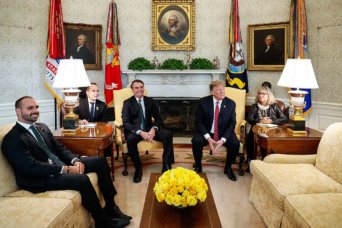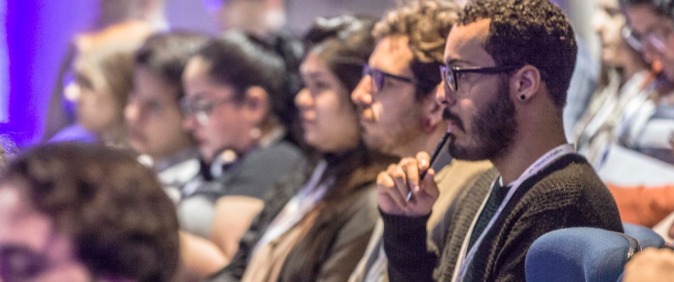- About
- Topics
- Picks
- Audio
- Story
- In-Depth
- Opinion
- News
- Donate
- Signup for our newsletterOur Editors' Best Picks.Send
Read, Debate: Engage.
| topic: | Democracy |
|---|---|
| located: | Brazil |
| editor: | Ellen Nemitz |
“If the left radicalizes to this extent [in Brazil] we will need to respond, and that response could come via a new AI-5”, said Eduardo Bolsonaro, son of Brazilian president Jair Bolsonaro and congressman, mentioning protests in Chile. After being criticized by politicians from all sides and also by the Supreme Court, he regretted and apologized for the statement, but there are still reasons for worries: AI-5, or Institutional Act Number Five, was the most authoritarian decree of the military dictatorship. Issued in 1968, it allowed measures such as closing congress and censoring arts and press.
“The military themselves admitted that the AI-5 turned the ‘military regime’ into dictatorship. So, asking for a new AI-5 is the same as asking democracy to be attacked”, explains Lucas Paolo Vilalta, coordinator of Memory, Truth and Justice unit of Vladimir Herzog Institute (the mission of this institute is “fighting for democratic values” and it was created in honor of a journalist killed during dictatorship, in 1975). For his statement, Eduardo Bolsonaro can have the mandate revoked, something necessary in the opinion of Vilalta: “It is not possible for a democracy to tolerate the intolerable, to allow attacks on its own democratic institutions”.
Bolsonaro’s son is not the only one to allude to dictatorship. General Augusto Heleno, institutional security chief, denied that a new AI-5 is on its way, but affirmed that it would be necessary to “study how to do it” in a democratic context. In addition, he and other government members, including the president himself, defend a different way to call the 1964 coupe d’etat, as it was a “movement against communism”. However, denying documented facts is not possible, as affirms Lucas Paolo Vilalta.
“In a democracy there must be a defense of plurality of views and narratives about facts, but the narratives cannot be fanciful. Versions that argue there was no coup d’etat and dictatorship, that there would have a communist revolution underway, must be supported by facts rather than mere opinions”, he says, adding that "documents show that civilian-military meetings were held to plan the overthrow of president João Goulart, orchestrating a coup d’etat".
Military intervention periods left behind over 400 people tortured, dead or disappeared, as reports the National Truth Commission (CNV in its Portuguese acronym). The work of rescuing the country's memory also bequeathed 29 recommendations in order to “prevent serious human rights’ violations, ensure its non-repetition and promote the strengthening of democratic state”. Ensuring that these recommendations will be followed, by informing the society and reporting to institutions such as the Supreme Court, is the goal of newly created project Monitora CNV, launched in September with the presence of the former Spanish judge Baltasar Garzón.
This initiative, coming from an institute committed to the defense of a free journalism and to human rights, is just in time. Since the beginning of the mandate, in January 2019, Jair Bolsonaro has done at least 99 attacks on the press, according to National Federation of Journalists. Recently, after being mentioned in the case of Marielle Franco’s murder (a politician and human right’s activist killed in March 2018), Bolsonaro called journalists and media responsible for the reporting “scumbag”. “We are working together with other organizations on the rejections to all attacks on democracy and on freedom of the press”, categorically states Lucas Paolo Vilalta, representing Vladimir Herzog Institute.

